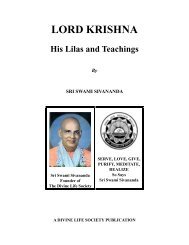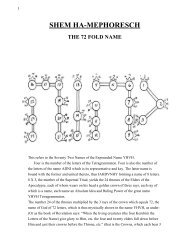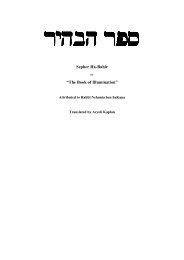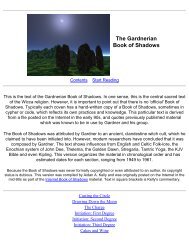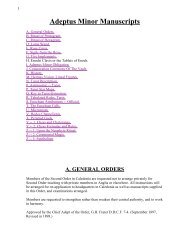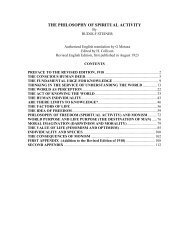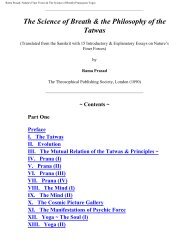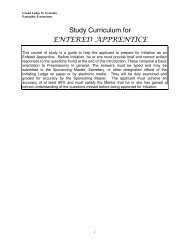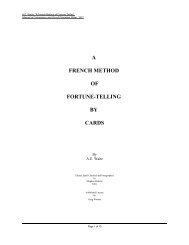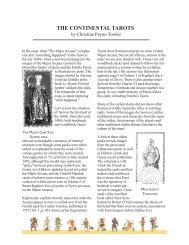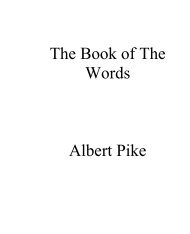Band 2 Anthropogenesis - H.P. Blavatsky
Band 2 Anthropogenesis - H.P. Blavatsky
Band 2 Anthropogenesis - H.P. Blavatsky
You also want an ePaper? Increase the reach of your titles
YUMPU automatically turns print PDFs into web optimized ePapers that Google loves.
[[Footnote(s)]] -------------------------------------------------<br />
* Vide "Vishnu-Purana," Book III., chap. 2.<br />
** In the oldest MS. of "Vishnu-Purana" in the possession of an Initiate in Southern India, the god is not Indra, but Kama,<br />
the god of love and desire. See text further on.<br />
------------------------------------------------------------------------<br />
[[Vol. 2, Page]] 175 A SAINT -- HYPNOTISED.<br />
the reverse that we find in all the Puranic allegories, and not without good esoteric reason.<br />
The king of the gods (or Indra) sends a beautiful Apsarasas (nymph) named Pramlocha to seduce Kandu and disturb his<br />
penance. She succeeds in her unholy purpose and "907 years six months and three days"* spent in her company seem<br />
to the sage as one day. When this psychological or hypnotic state ends, the Muni curses bitterly the creature who<br />
seduced him, thus disturbing his devotions. "Depart, begone!" he cries, "vile bundle of illusions!" . . . And Pramlocha,<br />
terrified, flies away, wiping the perspiration from her body with the leaves of the trees as she passes through the air. She<br />
went from tree to tree, and as, with the dusky shoots that crowned their summits, she dried her limbs, the child she had<br />
conceived by the Rishi came forth from the pores of her skin in drops of perspiration. The trees received the living dews;<br />
and the winds collected them into one mass. "This," said Soma (the Moon), "I matured by my rays; and gradually it<br />
increased in size, till the exhalation that had rested on the tree tops became the lovely girl named Marisha."**<br />
Now Kandu stands here for the First Race. He is a son of the Pitris, hence one devoid of mind, which is hinted at by his<br />
being unable to discern a period of nearly one thousand years from one day; therefore he is shown to be so easily<br />
deluded and blinded. Here is a variant of the allegory in Genesis, of Adam, born an image of clay, into which the "Lordgod"<br />
breathes the breath of life but not of intellect and discrimination, which are developed only after he had tasted of the<br />
fruit of the Tree of Knowledge; in other words when he has acquired the first development of Mind, and had implanted in<br />
him Manas, whose terrestrial aspect is of the Earth earthy, though its highest faculties connect it with Spirit and the divine<br />
Soul. Pramlocha is the Hindu Lilith of the Aryan Adam; and Marisha, the daughter born of the perspiration from her pores,<br />
is the "sweat-born," and stands as a symbol for the Second Race of Mankind.<br />
As remarked in the foot note (vide supra) it is not Indra, who now figures in the Puranas, but Kamadeva, the god of love<br />
and desire, who sends Pramlocha on Earth. Logic, besides the esoteric doctrine, shows that it must be so. For Kama is<br />
the king and lord of the Apsarasas, of whom Pramlocha is one; and, therefore, when Kandu, in cursing her,<br />
[[Footnote(s)]] -------------------------------------------------<br />
* These are the exoteric figures given in a purposely reversed and distorted way, being the figure of the duration of the<br />
cycle between the first and second human race. All Orientalists to the contrary, there is not a word in any of the Puranas<br />
that has not a special esoteric meaning.<br />
** "Vishnu Purana," Book I., ch. 15. Cf. also Vivien's temptation of Merlin (Tennyson), the same legend in Irish tradition.<br />
------------------------------------------------------------------------<br />
[[Vol. 2, Page]] 176 THE SECRET DOCTRINE.<br />
exclaims "Thou hast performed the office assigned by the monarch of the gods, go!" he must mean by that monarch<br />
Kama and not Indra, to whom the Apsarasas are not subservient. For Kama, again, is in the Rig Veda (x. 129) the<br />
personification of that feeling which leads and propels to creation. He was the first movement that stirred the ONE, after<br />
its manifestation from the purely abstract principle, to create, "Desire first arose in It, which was the primal germ of mind;<br />
and which sages, searching with their intellect, have discovered to be the bond which connects Entity with Non-Entity." A<br />
hymn in the Atharva Veda exalts Kama into a supreme God and Creator, and says: "Kama was born the first. Him,<br />
neither gods nor fathers (Pitara) nor men have equalled." . . . . The Atharva Veda identifies him with Agni, but makes him<br />
superior to that god. The Taittariya Brahmana makes him allegorically the son of Dharma (moral religious duty, piety and<br />
justice) and of Sraddha (faith). Elsewhere Kama is born from the heart of Brahma; therefore he is Atma-Bhu "Self-<br />
Existent," and Aja, the "unborn." His sending Promlocha has a deep philosophical meaning; sent by Indra -- the narrative<br />
has none. As Eros was connected in early Greek mythology with the world's creation, and only afterwards became the<br />
sexual Cupid, so was Kama in his original Vedic character, (Harivansa making him a son of Lakshmi, who is Venus). The<br />
allegory, as said, shows the psychic element developing the physiological, before the birth of Daksha, the progenitor of<br />
real physical men, made to be born from Marisha and before whose time living beings and men were procreated "by the<br />
will, by sight, by touch and by Yoga," as will be shown.<br />
This, then, is the allegory built on the mode of procreation of the Second or the "Sweat-born." The same for the Third<br />
Race in its final development.<br />
Marisha, through the exertions of Soma, the Moon, is taken to wife by the Prachetasas, the production of the "Mind-born"<br />
sons of Brahma also*, from whom they beget the Patriarch Daksha, a son of Brahma<br />
[[Footnote(s)]] -------------------------------------------------<br />
* The text has:-- "From Brahma were born mind-engendered progeny, with forms and faculties derived from his corporeal<br />
nature, embodied spirits produced from the limbs (gatra) of Dhimat (all-wise deity). These beings were the abode of the<br />
three qualities of deva-sarga (divine creation, which, as the five-fold creation, is devoid of clearness of perception, without<br />
reflection, dull of nature). But as they did not multiply themselves, Brahma created "other mind-born sons like himself,"<br />
namely, the Brahma-rishis, or the Prajapati (ten and seven). Sanandana and the other sons of Vedhas (Brahma) were<br />
previously created, but, as shown elsewhere, they were "without desire or passion, inspired with holy wisdom, estranged<br />
from the universe and undesirous of progeny" (Book I, ch. 7). These Sanandana and other Kumaras are then the Gods,



